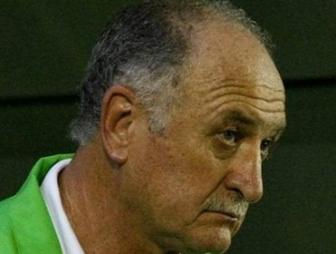 Seen enough - Phil Scolari quit his role as Palmeiras boss this week
Seen enough - Phil Scolari quit his role as Palmeiras boss this weekJonathan Wilson explains where and why it has all gone wrong for 'Big' Phil Scolari after the World Cup winning boss 'quit' his role as Palmeiras manager last week...
The moustache droops a little now. The eyes don't flash with quite the same anger. The swagger seems a little forced. Big Phil Scolari, frankly, doesn't seem quite as big any more.
The man who survived the conflicting waves of public opinion to lead Brazil to their fourth World Cup in 2002, who led Portugal to the World Cup semi-final in 2006, who won Libertadores titles with Gremio and Palmeiras, now stands accused of cowardice.
Scolari returned to Palmeiras in June 2010 after a year chasing cash - over 10 million a year - with the Uzbekistani champions Bunyodkor. His first spell at the club, between 1999 and 2002, had brought the Copa do Brasil, the Copa Mercosur (the forerunner of the Copa Sudamericana) and, most impressively, the 1999 Copa Libertadores. He was named as South American coach of the year that season and he only left the club to take the Brazil national job.
His return generated great excitement but this is a different Scolari now.
Many have failed at Chelsea since Jose Mourinho's departure but what was damaging to Scolari was the way he failed. He is notorious for his temper, for the way he acts as a paterfamilias, protecting his players from external pressures while at the same time demanding from them absolute obedience. He liked to create an us-against-the-world mentality, the generation of which was used to explain his frequent boorishness in press conferences.
When Portugal manager, for instance, he refused to take a single question from a non-Portuguese speaker ahead of the World Cup semi-final against France in 2006, apparently with the intention of corralling the Lusaphones together against the rest. The effect, though, was to make him look petty; alongside his childishness, Raymond Domenech's subsequent clowning with a pretend glove puppet as Lilian Thuram spoke to the media came to seem like charming whimsy, rather than the attention-seeking weirdness it was.
At Stamford Bridge, though, not only was Scolari hostile to those on the outside, it turned out he generated no team spirit or togetherness among those on the inside.
The core of Mourinho loyalists was almost instantly sceptical. It didn't take long before the media were being briefed about the supposed inadequacy of Scolari's training sessions. He seemed weirdly unable to react, the colossus soon becoming hapless supply teacher watching as his charges ran wild and he contemplated his next move. Which turned out to be to Bunyodkor to milk the wealth of a grim dictatorship.
He did win the Copa do Brasil after his return to Palmeiras, but he left the club deep in relegation trouble. With 13 games remaining, they are eight points from safety. That would be bad enough, but Scolari left behind a sense of betrayal. "He asked to leave," said the Chilean midfield Jorge Valdivia. "It was a surprise to us. He had told the squad that if we went down he would go down with us, but after the match with Vasco he said he was quitting." Officially, "it was mutually decided to terminate the contract" - usually a euphemism for dismissal - but Valdivia makes it sound as though Scolari was quite happy to accept the decision, which of course leaves him available should Mano Menezes be dismissed as national boss.
Palmeiras have lost seven of their last nine games and the sense is that if they don't improve that run away to Figueirense, the side one place above them, on Saturday, then they are doomed. Figueirense, after a dreadful start that saw them win just one of their first 15 games, have improved of late, taking 11 points from their last seven games and look decent value at 2.3411/8, particularly given that Palmeiras have lost 10 of their 12 away matches they are [2.7n/a to win].
A new manager may change things, of course, but recently Palmeiras have favoured a 4-2-2-2, something they stuck to under the caretaker Narciso in the defeat to Corinthians at the weekend. That in theory means that Marcos Assuncao and Joao Vitor, the two holders, should be able to restrict Daniel Carvalho, the playmaker in the Figueirense 4-3-1-2, but the danger for Palmeiras is that the home side have so much possession that almost becomes an irrelevance, particularly if they can get their full-backs, Mendonca Cicinho and Evanildo Juninho, forward.
Комментариев нет:
Отправить комментарий